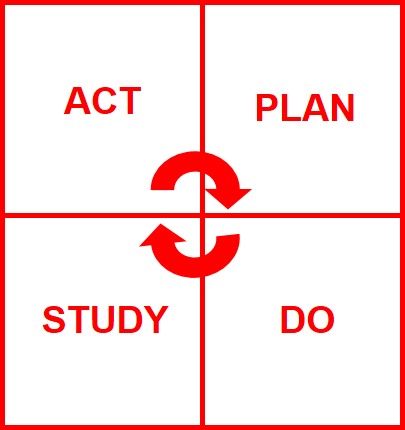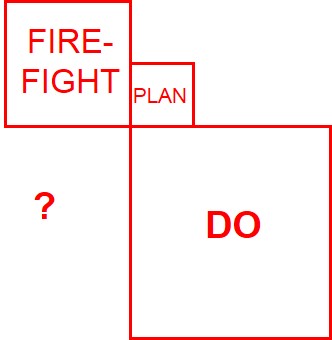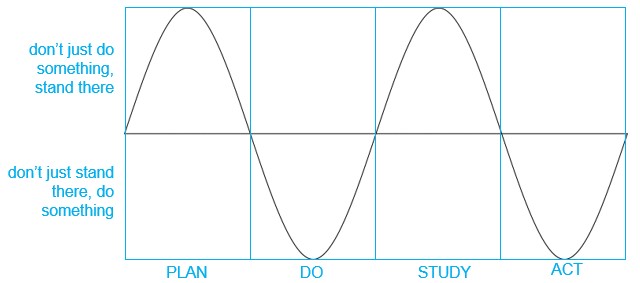The twin drives for Operational Excellence and Business-School-inspired ‘Imperative For Action’ have generated enormous ROI for enterprises around the world. But inside every silver lining is a cloud…
…most enterprises are now so ‘Action-Oriented’ they forget to engage their collective brains. 98% of all change initiatives fail. 90% of them failed the day they started.
As with all things, the original concepts tend to get corrupted. Take ‘continuous improvement’, the primary engine behind Operational Excellence since the Japanese-lead Quality revolution of the 70s. One of the main ideas underpinning continuous improvement is the Plan-Do-Study-Act cycle. It is pretty much ubiquitous inside any enterprise these days. As a customer, I’d say that was a good thing.
When the originators of Plan-Do-Study-Act thought about things, they came up with the idea that each of the four activities required about the same level of time and attention. The area of the four boxes, in other words, was designed to illustrate time.
This is the bit that has been corrupted. It’s all well and good for people like George Washington to talk about chopping down trees in eight hours and spending six of those hours sharpening the axe, but in ‘Imperative for Action’ World, those six hours of sharpening can very quickly come to look and feel like waste. And in Operational Excellence Land, waste is very definitely unwelcome. If we can’t tangibly see and feel ‘progress’, then it gets categorised as bad. If my boss comes into my cubicle and sees me drawing something on the CAD system, or, better still, comes into the lab and sees me busy doing stuff, then she goes away happy. If she sees me scratching my chin thinking about stuff, I don’t look busy, and i’m more likely to be rebuked than rewarded for my ‘slacking’: ‘Don’t just stand there, do something’.
I’m sure it’s not the case in your organisation, but if I had to draw an average of the amount of time I see companies or teams Planning, Doing, Studying and Acting, I think the picture I’d find myself drawing is this:
In the Doing box, everything looks fine. We like ‘Doing’. We look busy and we feel busy, and both are psychologically very appealing. Planning, on the other hand, is psychologically very unappealing. When we’re Planning something we don’t look busy and we don’t feel busy either. Planning can very easily begin to look and feel like waste. Even more scary is that when we’re thinking about what we’re supposed to be doing, we might inadvertently find some bad news that causes us to have to go backwards. Even worse still, we might have to go and tell our boss as much. All the time knowing that messengers find themselves shot more often than celebrated. Better to brush bad news under the carpet, and get on to the Doing part of the job.
Then, when we’ve finished Doing something, we’re supposed to step back and Study what we’ve Done. More chin-stroking. More psychological discomfort. Especially since most company’s don’t know what they’re supposed to be Studying at this point.
What very likely does happen during this Study phase, however, is the bad news re-appears from under the rug and it becomes obvious to all that we’ve Done the wrong thing. And so the Act phase of the continuous improvement cycle quickly turns into Firefighting. Which also turns out to be very appealing, psychologically-speaking. The expression ‘firefighters light fires’ exists for a reason. Firefighters get to be the hero when the problem is solved. Hooray.
Except, of course, for the fact thatwe’ve just consumed a vast amount of time and effort conducting nugatory activities. We spent most of our time looking anf feeling busy, but most of that time we were busy being fools. Operationally excellent fools, admittedly, but fools all the same.
That was the real waste.
Sadly, I don’t think any manager inculcated into the ways of Operational Excellence is going to be very compfortable using expressions like, ‘don’t just do something, stand their’ to their workers. It’s just not the way we’re all wired. We’re wired to Do. And more specifically to Do what gets rewarded.
But I think what we can hope for, is that we ask better questions during the Planning and Studying phases of the continuous improvement cycle (i.e. TRIZ), and that we might start to get managers to design systems that reward people for sometimes not doing, and standing there instead.



